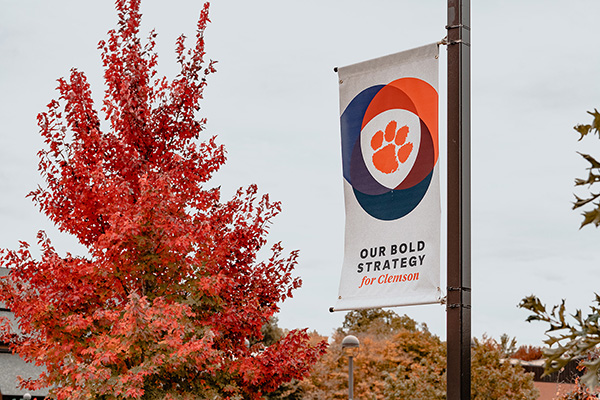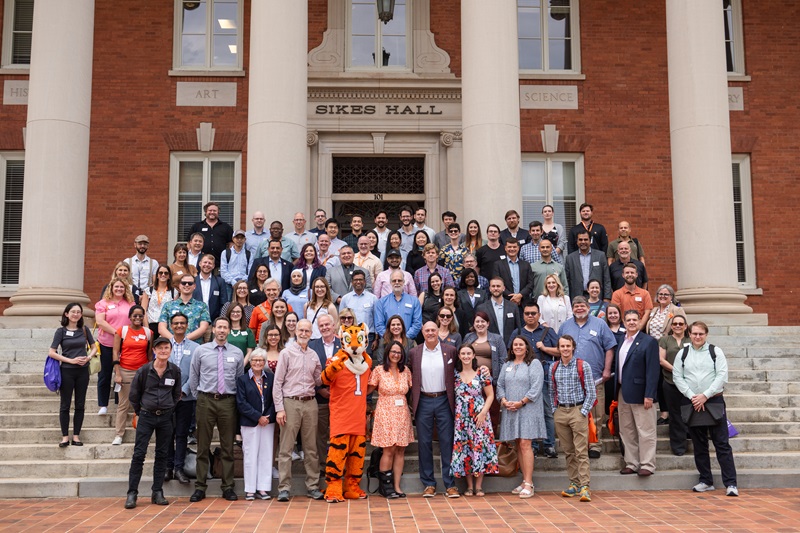Faculty Mentoring at Clemson

The quality of a student’s educational experience is directly tied to the lives of their faculty. To provide Clemson students with the #1 educational experience, it is critical to also prioritize elevating faculty engagement, success, and job satisfaction. A key component of the multipronged approach taken by Clemson University is the formal faculty mentoring activities provided by academic units.
We define formal mentoring of faculty at Clemson as the intentional pairing between mentee(s) and mentor(s) by unit leadership, with the mentor assuming the responsibility for facilitating the mentee's professional development. Mentor support can include providing advice, institutional or domain knowledge, encouragement, and/or networking connections. The mentor can be from within or external to Clemson University as long as the mentoring relationship is codified and facilitated by the mentee’s department/academic unit or college.
The two most common types of formal mentoring at Clemson include one-on-one mentoring and mentoring circles. The university….
- One-on-One Mentoring: Mentors and mentees are matched and then have formal meetings to discuss topics chosen by the mentee, mentor, or department. This can include a mentee having two or more than one-on-one mentor. For example
- Mentoring Circles: Participants meet in small groups to help mentor one another through discussions and sharing. This group is facilitated by a mentor such as a senior colleague.
Informal mentoring at Clemson refers to mentoring relationships developed outside of structured programs or frameworks facilitated and codified by a department/academic unit or college. While informal mentoring can be impactful for faculty, the ability to access informal mentoring is typically not aseffective to access as formal mentoring across faculty. Therefore, the Office of Faculty Affairs has intentionally decided to track only formal mentoring at this time. Individual faculty are still encouraged to record both formal and informal mentoring in the Faculty Success system as professional development activities.
Formal and informal mentoring is not the same as performance evaluation. At Clemson, discussion of a Form 3 evaluation would be considered performance evaluation and not mentoring. While performance feedback and mentoring can sometimes be completed in the same meeting, mentoring is distinct from this process as it provides faculty with advice, insight, and/or information to further develop their potential as scholars and academic professionals.
Mentoring at Clemson University
Clemson has a long history of providing programming and support for early career faculty as they onboard and work towards earning promotion and tenure. Evaluators of past programs identified the need to extend these efforts to mid- and advanced-career faculty. In response to this need and the importance of mentoring broadly, a University Faculty Mentoring Committee was charged and created to elevate the mentoring initiative across the institution. This committee is composed of senior level faculty and Associate Deans for Faculty Success from every college. This committee has developed and approved a shared definition of mentoring for Clemson University such that we are all working from the same understanding.
Mentoring is the intentional pairing between mentee(s) and mentor(s) by unit leadership, with the mentor assuming the responsibility for facilitating the mentee's professional development.
The intentional pairing between mentee(s) and mentor(s) by unit leadership, with the mentor assuming the responsibility for facilitating the mentee's professional development.
The mentor can be from within or external to Clemson University as long as the mentoring relationship is codified and facilitated by the mentee’s department/academic unit or college.

Who Are Mid-Career Faculty
Mid-career faculty are professors and researchers who have completed their probationary years (earned promotion or tenure) but are not yet preparing for their retirement (Baldwin and Chang, 2006). Such faculty at Clemson have a direct impact on the prosperity of their respective departments, transforming lives and serving their students with invaluable skill, expertise and guidance gained from years of dedication and professionalism. This is true despite the many challenges that can come during this career stage: significant life transitions, identifying desired career trajectories and making or changing career trajectories. Recent surveys have suggested that faculty in this mid-career stage have relatively lower levels of job satisfaction and higher levels of burnout (2022 Faculty Retention Survey, Academic Impressions).
Given this, the Office of Faculty Advancement takes it as its charge to develop and implement evidence-based techniques to help mid-range faculty combat the negative effects of career burnout and stagnancy and to help elevate mentoring as an integral component of department, college and university programming for wider Institutional success.

Mentoring Resources and Workshops
Virtual Professional Development Seminars and Writing Groups
While we highly encourage you to request mentoring and coaching within your college or department, external resources are available to help you navigate this stage of your career. Clemson University provides you with access to two faculty development platforms: Academic Impressions and the NCFDD. Review a brief description of each platform below and learn how you can access them.
Academic Impressions is focused on professional and leadership training for faculty, staff and administrators in higher education. Users can access both asynchronous and live seminars. Clemson University has a site license for this professional development program, and you can login using your Clemson credentials with no additional registration needed for most courses, webinars and training. Once you choose a topic you are interested in, you can then click on the ‘login/create account’ tab. As a Clemson faculty member, you may use your institutional email and password.
In addition to Academic Impressions, Clemson faculty also have access to the NCFDD portal. One of the most popular components of this platform is two-week writing accountability groups, as well as on-demand seminars and live events.
Writing Sessions
The Office of Faculty Advancement offers monthly writing groups to help faculty make progress on their scholarship.
Faculty Forums
Each month, a discussion session is facilitated to help faculty learn about the institutional support for faculty, meeting with administrators and discussing best practices for their unique circumstances.
Academic Texts
If you are interested in learning more about mid-career faculty and professional development, we would suggest the following books:
- Baker, V. L. Charting Your Path to Full: A Guide for Women Associate Professors; Rutgers University Press, 2020.
- Baker, V. L. Managing Your Academic Career: A Guide to Re-Envision Mid-Career; Routledge, 2022.
- Newport, C. Deep Work: Rules for Focused Success in a Distracted World; Little, Brown Book Group, 2016.
- Baker, V. L.; Lunsford, L. G.; Neisler, G.; Pifer, M. J.; Terosky, A. L. Success after Tenure: Supporting Mid-Career Faculty; Taylor and Francis, 2023.
